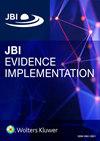Leading the way: implementing aged care innovations.
IF 1.1
4区 医学
Q2 HEALTH CARE SCIENCES & SERVICES
引用次数: 0
Abstract
OBJECTIVES The objective of this study was to identify the key characteristics of leaders that support the implementation of innovations in aged care settings. METHODS We conducted a secondary analysis of papers from a large scoping review that identified how leaders supported the implementation of innovations in aged care. Once imported into NVivo12, the findings were deductively coded using the domains of Bloom's taxonomy of learning. Each parent code was then inductively analyzed to identify key characteristics within each domain. RESULTS Our review identified four types of knowledge, five skills, and six attitudes that leaders should exhibit to better support the implementation of innovations within aged care settings. In addition to our findings regarding Bloom's learning domains, we identified nine leadership behaviors that participants in the included papers perceived as valuable for enhancing the implementation process. Furthermore, we identified four key organizational elements that support leaders in navigating and facilitating the implementation of innovations within aged care settings. CONCLUSION Our review identified the characteristics that leaders should demonstrate when supporting the implementation of innovations in aged care. Importantly, our findings also emphasized the changing role of leadership from a hierarchical approach to a more collaborative, supportive, and empowering style. The insights identified in this review will help to guide aged care leaders, stressing the significance of adaptable and relational leadership styles that will guide the implementation of innovations within the aged care sector. SPANISH ABSTRACT http://links.lww.com/IJEBH/A271.引领潮流:实施老年护理创新。
本研究的目的是确定支持在老年护理机构中实施创新的领导者的关键特征。方法我们对大型范围综述中的论文进行了二次分析,这些论文确定了领导者如何支持在老年护理机构中实施创新。在将研究结果导入 NVivo12 后,我们使用布卢姆学习分类法的各个领域对研究结果进行了演绎编码。我们的综述确定了领导者应具备的四种知识、五种技能和六种态度,以更好地支持创新在养老机构中的实施。除了有关布鲁姆学习领域的研究结果之外,我们还发现了九种领导行为,这些行为在收录的论文中被参与者认为对加强实施过程很有价值。此外,我们还确定了四个关键的组织要素,这些要素可支持领导者在老年护理环境中引导和促进创新的实施。重要的是,我们的研究结果还强调了领导角色的转变,即从等级制方法转变为更具协作性、支持性和授权性的风格。本综述中提出的见解将有助于指导老年护理领域的领导者,强调适应性和关系型领导风格的重要性,从而指导老年护理领域创新的实施。西班牙文摘要http://links.lww.com/IJEBH/A271.
本文章由计算机程序翻译,如有差异,请以英文原文为准。
求助全文
约1分钟内获得全文
求助全文

 求助内容:
求助内容: 应助结果提醒方式:
应助结果提醒方式:


